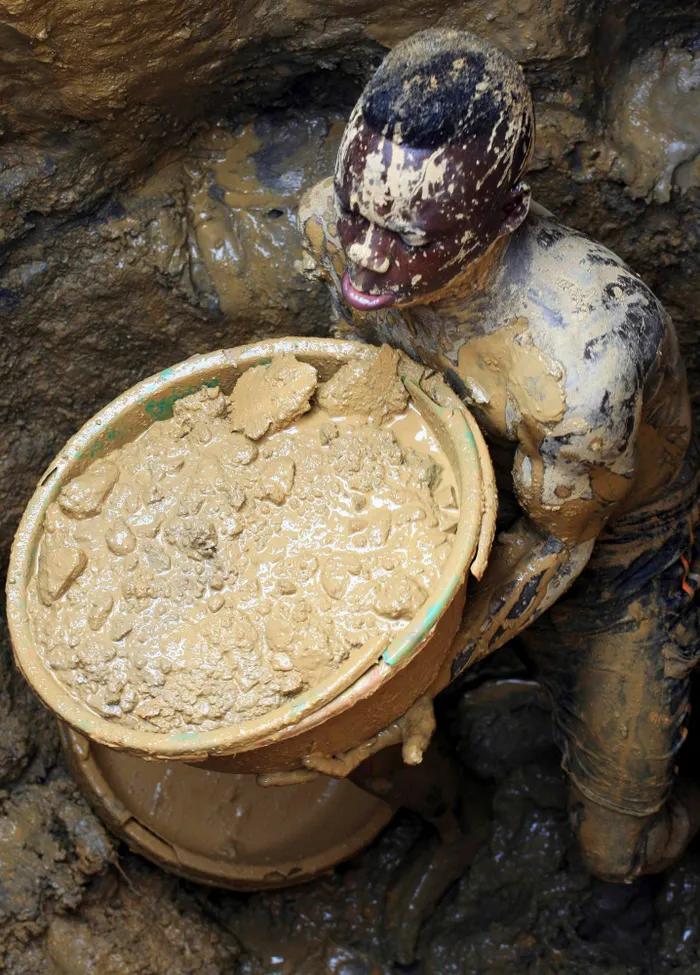Russia, SA on Space, co-operation mission

Picture: James Akena/REUTERS/taken October 30, 2006 – A man lifts a bucket filled with mud as he searches for gold nuggets.
Picture: NASA/ESA via Wikimedia – Southern Ring Nebula. The South African embassy has cited the joint use of the Panoramic Electro-Optical System (PanEOS) to detect and measure the motion parameters of space objects as an example of the countries’ common activities in the space sector
By Maxim Grishenkin
The Russian state space company Roscosmos earlier announced its intention to sign full-scope agreements on space co-operation with African countries at the Russia-Africa forum.
South Africa and Russia will maintain win-win co-operation in the fields of space and science, South Africa’s Embassy to Russia told Sputnik Africa.
“South Africa and Russia will continue pursuing mutually beneficial co-operation in the area of space, and generally in science, innovation and technology,” the embassy said.
According to the diplomatic body, Pretoria will facilitate the development of co-operation in these “priority areas”.
These issues, the embassy noted, are considered by the countries within the annual bilateral mechanism, namely the Joint Intergovernmental Committee on Trade and Economic Co-operation.
Speaking of specific examples of the countries’ common activities in the space sector, the embassy cited the joint use of the Panoramic Electro-Optical System (PanEOS) to detect and measure the motion parameters of space objects.
In this vein, Russia agreed with South Africa to set up a PanEOS antenna in the African country, authorities stressed.
“It is anticipated that this state-of-the-art scientific instrument will assist many agencies with future launches into space, as it will help them avoid possible collisions with space junk,” the embassy noted, adding that it is an “important demonstration of social responsibility – not only for our own planet, but for space itself”.
In June, the executive director of the South African National Space Agency, Khumbulani Mudau, stated that South Africa was ready to engage in space co-operation with Russia.
By Maxim Grishenkin

Mali is one of Africa’s biggest gold producers and home to numerous industrial mines operated by companies including Barrick Gold and AngloGold Ashanti, which are included in the top ten gold-producing enterprises.
Mali’s revenue from gold mining grew by 35 percent in 2022 to a record $1.3 billion, according to Mamadou Sidibe, director of the Mines Ministry’s statistics unit.
A major driver for the rise in gold mining revenues was the increase in tax revenues from the sector, Sidibe stressed.
“The increase is mainly attributable to the great performance of all the collection services, which are the tax services, customs and estate services,” he said.
In early June, Mali’s Ministry of Mines issued a revised forecast that the West African nation will increase gold production by 2.3 percent this year.
While the earlier forecast anticipated that the country would produce 63.9 tons in 2023, the updated forecast has been raised to 67.7 tons (up 6 percent).
In 2022, Mali was one of the top four gold-producing countries in Africa, behind South Africa, Ghana, and Burkina Faso.
The production of industrial gold for the year amounted to 66.2 tons, about 4.4 percent higher than the previous year, according to the Malian ministry.
Malian gold is predominantly exported to South Africa, Switzerland and Australia.
AFP

Twenty-two countries from around the globe have applied to join the BRICS bloc and more have shown interest, South Africa said Thursday, ahead of the five-nation group’s summit next month.
BRICS, an economic bloc which sees itself as a counterweight to Western economic domination, derives its name from Brazil, Russia, India, China and South Africa. The bloc has previously indicated it is open to expansion.
“Twenty-two countries have formally approached BRICS to become a full member of the group, there’s an equal number of countries that have been informally asking about becoming BRICS members,” South Africa’s ambassador-at-large for Asia and the BRICS, Anil Sooklal, told media in Johannesburg.
He listed Iran, Argentina, Bangladesh and Saudi Arabia among nations that have expressed an interest.
According to Sooklal, growing interest in the bloc is not new but reflects the “confidence” in the work that BRICS has been “championing” over nearly a decade and a half.
BRICS is not only “a power force [...] in trying to change the faultlines in terms of global politics, but it is also changing what is happening in the economic space globally”, he said.
“The current global architecture continues to be unequal, continues to marginalise developing countries [...] and continues to be dominated by a few hegemons. We don’t want such a world. We want a world where our voices are heard,” he stressed.
South Africa will host the BRICS summit in Johannesburg between August 22-24 to which a total of 69 countries have been invited, including all African states.
French leader Emmanuel Macron has asked to attend the summit but no decision has been reached yet on that request.
“There is high interest in the summit [...]. BRICS is a consensus entity, it’s not South Africa’s decision alone, this has to be consulted,” said Sooklal, adding that Foreign Minister Naledi Pandor “is busy with that process”.
Formally launched in 2009, BRICS now accounts for 23 percent of global GDP and 42 percent of the world’s population, according to the summit’s website.
These articles were published on Sputnik